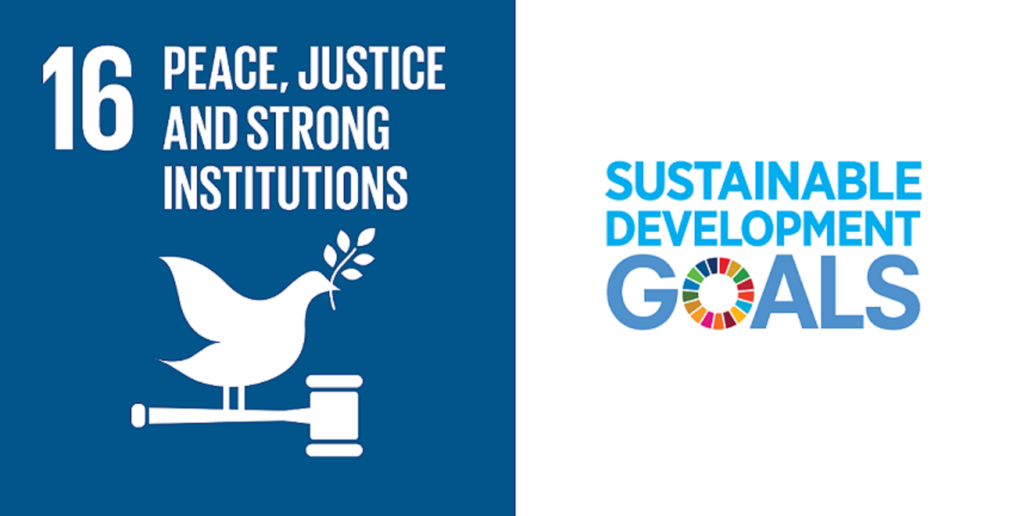Highlight 12/2023 – Implementation, monitoring, accountability and review of SDG 16 (Peace, justice and strong institutions) in the case of Palestine and Ghana
Juan Pamplona, Iba’a Hamida, and Mohammed Al-Khaifi, 29 March 2023

Frequently, some individuals, communities and nations tend to consider that peace, justice and strong institutions are elements that explicitly relate to the context of violent conflicts, whether national or international; nonetheless, these concepts impact and are of monumental significance on the whole of the local, regional and global level. Sustainable Development Goals (“SDG”) are the blueprint to achieve a better and more sustainable future for all, because they address the global challenges we face, including poverty, inequality, climate change, environmental degradation, peace and justice.
SDG 16 ushers in a new kind of development, one where people could influence the decisions that affect their lives and create communities that thrive by articulating the key role that governance and the rule of law play in promoting peaceful, just, and inclusive societies and in ensuring sustainable development. Consequently, to provide one differentiated approach to this issue, this discussion will focus on the importance of implementation, monitoring, accountability and review.
On the one hand, in relation to implementation and monitoring, the Palestinian situation is a prime example. The Palestinian Government developed National SDG Teams made up of representatives from various stakeholder groups as a follow-up to its inaugural VNR presented in 2018. To undertake monitoring and reporting, offer suggestions and policy proposals, and create interventions to support the implementation of each SDG, each SDG Team collaborates with appropriate field actors. It is a special procedure made to combine the abilities and knowledge of all important national actors.
The Independent Commission for Human Rights (ICHR), a Palestinian NHRI, participates in national SDG processes by proposing a human rights-based strategy for the implementation and oversight of the 2030 Agenda. The Palestinian Central Bureau of Statistics, the Ministry of Justice, the Ministries of Finance, Women’s Affairs, Social Development, Interior, and Local Government, the police, eight human rights organizations, including the NHRI, civil society organizations, academic institutions, the General Personnel Council (civil servants), one media representative, and oversight organizations like transparency, accountability, and anti-corruption institutions make up the SDG 16 team.
The Team decided to gather data and information for 75 indicators in total (including global and national indicators) after assessing the data collecting abilities of its members to allow for an in-depth analysis of the SDG 16 targets. The SDG 16 Team will submit a report for the Prime Minister’s Office based on the data provided by its members.
On the other hand, with respect to accountability, the Ghanian case is a clear example. The Ghanian NHRI, also known as the Commission on Human Rights and Administrative Justice (“CHRAJ”) is a member of the multi-sectoral SDG Implementation Coordination Committee (“ICC”) of Ghana. The commission is composed of representatives from key ministries, public agencies, and civil society organizations.
The CHRAJ plays a key role in improving accountability in Ghana, taking its advantage of being the coordinating body for the National Anti-Corruption plan. In relation to SDG 16, the Commission hosts a few thematic national and international conferences to address advancement of the implementation of this goal, such as urging the relevance of connecting human rights in anti-corruption. That is completed by empowering institutions, ensuring the rule of law, and granting access to justice.
To achieve the designated goal, CHRAJ organized a national Conference on Anti-Corruption and Transparency. High-level officials (including Ghana’s Vice-President), key representatives from justice and governance sectors, civil society, the UN and private sector all attended the conference. The conference reviewed the existing policies and strategies along with agreeing on the measures to strengthen institutions that take part in fighting corruption and assuring transparency and accountability.
Finally, to condense both cases, it is relevant to remember the importance of review. Figures show that 205 voluntary national reviews (VNR) have been submitted from 168 countries; since 2016, there is a growing tendency in the number of quantities of VNR’s submitted by countries, which proves the increasing relevance and utility for State and non-State actors.
Other findings show: (1) SDG Coordination Bodies or Mechanisms are genuine means of strengthening VNR processes and SDG 16 Implementation; (2) Government oversight and stakeholder engagement are essential for ensuring accountability and practicing a whole of Government and whole of society approach; (3) in terms of localization and ownership, listening and engaging from the community-level up resulted a crucial element when addressing inclusion at different levels; (4) in relation to data and related Reporting Mechanisms, gathering and analyzing information continues to represent a major challenge in terms of progress tracking; (5) regarding financing and partnerships, greater focus needs to be placed on innovative solutions to funding and financing gaps facing governments, civil society and other stakeholders working to advance SDG 16; (6) and, in essence, there’s a need to strengthen VNR design and to move forward In accountability to properly ensure the accomplishment of SDG 16.
Juan Pamplona, Iba’a Hamida, and Mohammed Al-Khaifi, Highlight 12/2023 – Implementation, monitoring, accountability and review of SDG 16 (Peace, justice and strong institutions) in the case of Palestine and Ghana, 29 March 2023, available at www.meig.ch
The views expressed in the MEIG Highlights are personal to the authors and neither reflect the positions of the MEIG Programme nor those of the University of Geneva.
